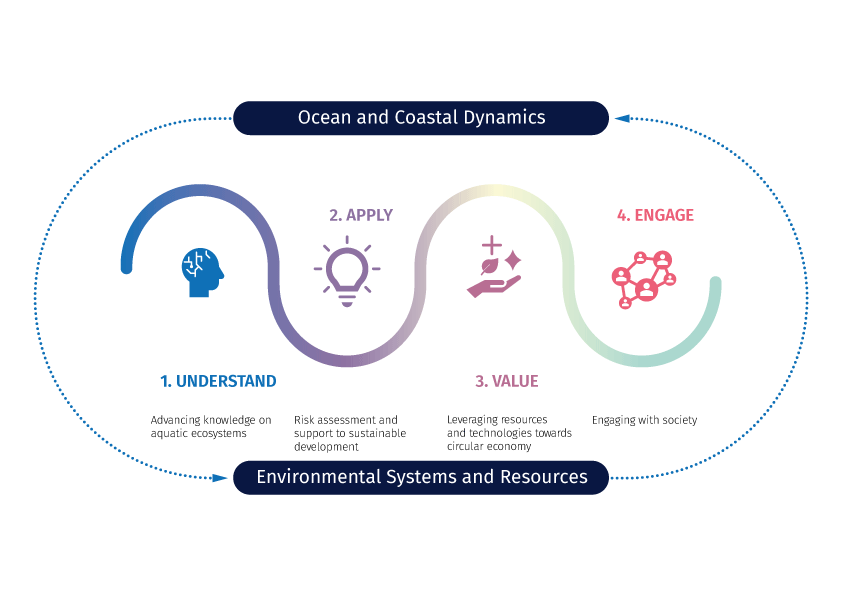

Ocean and Coastal Systems
Deepen the knowledge of the processes that dominate the dynamics and evolution of the oceans and coastal zones, aiming to the proper use and management of these environments
Analysis of eco-hydrodynamic processes in coastal waters
Ocean observation through operational oceanography and remote sensing
Study of coastal dynamics and assessment of associated risks
Environmental Systems and Resources
Promoting research applied to the environment and the exploitation of resources, aiming to increase the well-being and sustainability of our society in the context of a changing world
Climate change
Deep sea ecotoxicology
Environmental quality and remediation
Energy production from marine resources

Advancing Knowledge in Aquatic Ecosystems Dynamics
Strategic objective 1 aims to understand the impact of multiple stressors on marine and coastal ecosystems, identify the sources of land-based and marine old and emerging pollutants and contaminants, understand the ocean-climate link for a sustainable future, establish a sustainable ocean observing system that provides accessible, timely, and actionable data and information, and develop a comprehensive digital map of the ocean. It also includes the use of ocean observing systems and innovative coastal tools to document environmental change, to unravel the effects of climate change at different scales of analysis, to expand global ocean observations, and to improve the digital representation of the ocean. The following are the main tasks to be developed under this objective:
- Conduct comprehensive research on aquatic ecosystems;
- Apply socio-ecological frameworks in aquatic ecosystems.
Risk Assessment and support to Sustainable Development
By encompassing the physical, biological, social, and economic aspects identified in objective 1, strategic objective 2 aims to quantify the impacts of climate change and other anthropogenic stressors on natural systems, by assessing the vulnerability of oceans and coasts and providing sustainable solutions. It will actively promote the development of climate-resilient ecosystems (and nature-based approaches) for climate adaptation, ultimately playing a pivotal role in promoting biodiversity conservation and enhancing human well-being. The following are the main tasks to be developed under this objective:
- Identify environmental thresholds and assess resilience;
- Develop mitigation and adaptation pathways.
Leveraging resources and technologies towards circular economy
Strategic objective 3 involves the implementation of techniques and optimisation strategies within a circular economy framework for the sustainable use and valuation of biological, inorganic, and energy resources. An interdisciplinary approach will be taken to develop novel treatments, processes, and solutions to reduce waste, recover water resources, produce renewable energy, and maximise resource efficiency. The tasks within this objective are as follows:
- Re-purpose resources for sustainable use;
- Improve Blue and Green Energy Systems.
Engaging with Society
This objective aims to engage with society by sharing research findings, participating in executive and advisory boards, building partnerships with the public and private sectors, and enhancing capacity building. The following are the main tasks to be developed under this objective:
- Reinforce collaborations with institutions and civil society;
- Promote Science communication and training.